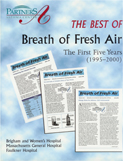Breath of Fresh Air: Feature Articles
Chapter 52: Getting Back in Control
Nancy D. had frequent and lingering bronchial infections as a child. It was not until her early twenties that she was diagnosed with asthma. She recalls: "When I first started to have asthma, it would be sporadic. Maybe three times a year it might kick up. Then it grew worse as I got older. There was a period of time when it was really quite severe; it was there more than it was gone. I'd seem to just get it under control and then it would pop up again. I wouldn't be asthma-free for longer than a period of — I'd say — about five weeks. Then it would start the wheezing again. That was a period of time when I was on prednisone a lot and seemed to grow dependent on it."
Asked about the impact of asthma on her life, she recalls her sensitivity to second-hand smoke exposure. "I found myself in positions sometimes where if I was in a room that was full of smoke I would have to leave. There were times when I had the asthma attacks so frequently that no matter what you planned to do, you never knew if you were going to be able to follow through with that plan, or you'd be away somewhere and you'd have to come home."
Some of her asthma attacks were frightening. "I can remember vividly a couple of times getting up in the night, waking up in a severe asthma attack and then you couldn't breathe. ... and attempting to set up my breathing machine and coming out into the kitchen and not being really able to set it up. To the point that I had to knock on the walls to wake somebody in the house. Another time I was away and the attack got quite severe. I think I let it get too severe without starting to take prednisone. I ended up in the emergency room, as I often did back in those days."
Nancy identifies as triggers to her asthma: changes in the seasons, going from warm to cold temperatures, infections ("colds"), a smokey environment, strong odors (such as perfumes in a closed space), and exercise. Her medications at present include inhaled steroids and oral and inhaled bronchodilators. "I very seldom have to use my Ventolin® inhaler. It's got to be a couple of months since I used it, and at that point I probably used it once. What a difference! I used to have it attached to me and used it too frequently."
Over the last several years she has gotten her asthma under good control. "I find that now that I have a little more control over it, even though I am faithful with my medications, asthma isn't the primary topic on my mind. Before, when you'd go out to jog in the snow or play with your children, you'd think about it, and now I don't seem to do that because I feel more confident and more prepared."
She credits the Asthma Center for much of her improvement. "It was a great turnaround for me. Just knowing when to act and feeling more confident about going ahead with doing something about it. I think what I've learned mostly is that you control [your asthma] and don't let it control you. It sort of gives you your life back a little bit."
Asked for her words of advice or encouragement for others, she offered the following: "You need to follow your treatments even on the good days when you're feeling well. I fell into that trap: once you get over an attack and you're feeling pretty well, you tend to slack off on your medication. I think that it's real important that you keep it up because even though the signs aren't there, you always have asthma."

